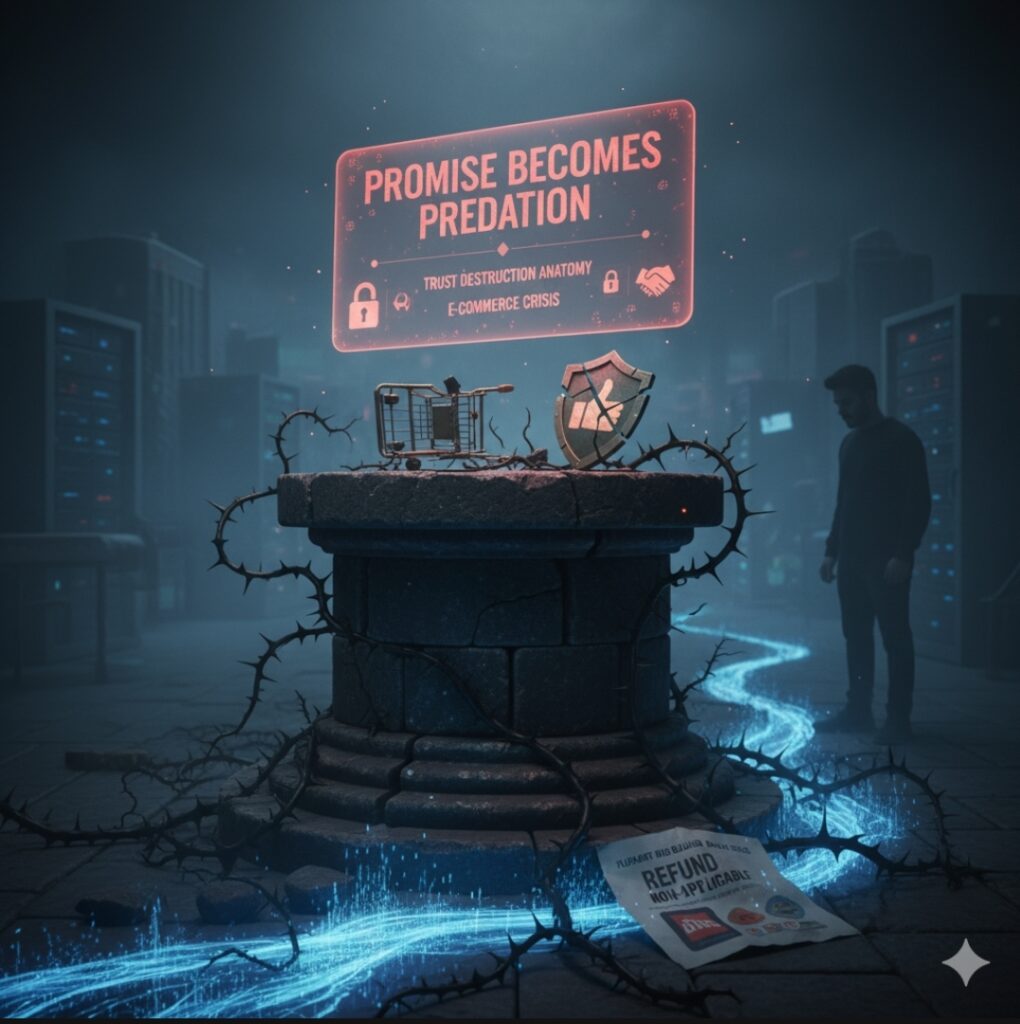The Pre-Reserve Pass Trust Deficit Crisis: How E-Commerce Deception Is Reshaping Customer Experience Forever
Picture this scenario: You’ve saved for months to buy the latest iPhone. An e-commerce giant launches a special “Pre-Reserve Pass” program, promising guaranteed access to discounted phones for just ₹5,000. You purchase the pass, successfully place your order, and eagerly track your package as it reaches your local delivery hub. Then suddenly, without explanation, your order vanishes from the system. Your money is gone, your phone never arrives, and the company’s terms clearly state your pass was “non-refundable.”
This isn’t fiction—it’s the reality thousands of Indian consumers faced during Flipkart’s Big Billion Days 2025 sale. But this incident represents something far more troubling than a single company’s misstep. It’s a wake-up call that exposes a fundamental crisis in e-commerce customer experience: the erosion of trust through deceptive practices that prioritize short-term profits over long-term customer relationships.
When Promise Becomes Predation: The Anatomy of Trust Destruction
The Flipkart Pre-Reserve Pass controversy exemplifies what consumer protection experts now classify as “dark patterns”—deliberate design choices intended to manipulate customer behavior. Customers who purchased these passes didn’t just lose their money; they experienced a betrayal that strikes at the core of what customer experience should represent.
Social media platforms erupted with complaints using hashtags like #FlipkartScam and #BigBillionDayScam. One affected customer captured the widespread frustration: “Big Billion Day = Big Fraud! Product reached my location and cancelled without any reason. This is clearly a scam.” The scale of impact remains staggering—with thousands of customers potentially affected and millions of rupees in non-refundable fees collected.
What makes this particularly damaging from a CX perspective is the calculated nature of the deception. The terms were designed to benefit the platform regardless of fulfillment success, creating what industry critics called “₹5,000 flat profit per undelivered order.” This represents the complete opposite of customer-centric thinking that should drive modern e-commerce strategy.
The Dark Pattern Epidemic: Beyond Single Incidents
The Flipkart incident isn’t isolated—it’s symptomatic of a broader crisis affecting the entire digital commerce landscape. The Central Consumer Protection Authority has identified thirteen distinct types of dark patterns plaguing Indian e-commerce platforms, from “basket sneaking” to “subscription traps.”
Recent government investigations have revealed widespread violations across major platforms. In October 2025, the Department of Consumer Affairs launched probes into multiple e-commerce companies for imposing hidden charges through deceptive labels. These practices include mysterious “offer handling fees,” “payment handling fees,” and “protect promise fees” that inflate final costs even after advertised discounts.
The impact on customer trust is measurable and severe. Research indicates that 88% of online shoppers reported at least one poor experience in the past year, with 49% of customers willing to switch to competitors after just one unsatisfactory experience. When that experience involves intentional deception rather than mere service failures, the damage multiplies exponentially.
The Regulatory Response: A New Era of Accountability
Recognizing the threat these practices pose to digital commerce growth, Indian authorities have mounted an unprecedented response. The Consumer Protection Act 2019 now explicitly categorizes dark patterns as unfair trade practices, with violations carrying significant penalties.
The Central Consumer Protection Authority issued comprehensive advisories in 2025, requiring all e-commerce platforms to conduct self-audits within three months to identify and eliminate dark patterns. This represents a fundamental shift from reactive to proactive consumer protection, with platforms now obligated to prove their innocence rather than wait for complaints.
Legal precedents are reinforcing this stance. In August 2025, the Delhi Consumer Court ordered Flipkart to pay ₹10,000 to a customer after canceling over sixteen confirmed orders without valid reasons. The court explicitly rejected the platform’s defense that it was merely an “intermediary,” establishing that e-commerce companies cannot absolve themselves of responsibility for customer experience failures.
The Trust Economics: When Deception Becomes Expensive
The financial implications of trust destruction extend far beyond immediate refunds or legal penalties. Customer lifetime value research shows that acquiring new customers costs six to seven times more than retaining existing ones. When platforms engage in deceptive practices, they’re essentially trading long-term revenue streams for short-term cash grabs.
Consider the mathematics of the Pre-Reserve Pass scheme: Even if Flipkart collected ₹50 million from 10,000 unfulfilled passes, the long-term cost in lost customer relationships, damaged brand equity, and reduced market confidence far exceeds this one-time revenue. The hashtags trending against the company represent thousands of potential customers who may never return, plus the amplified negative word-of-mouth that influences purchasing decisions within their networks.
Brand loyalty research confirms this pattern. Studies show that 37% of customers abandon brands due to poor product or service experiences, while pricing concerns account for only 17% of customer defections. This “price-experience gap” reveals that companies focusing solely on competitive pricing while neglecting experience quality are fundamentally misunderstanding customer priorities.
The Ripple Effect: Industry-Wide Implications
The trust crisis extends beyond individual companies to threaten the entire e-commerce ecosystem. When customers lose confidence in digital transactions, it affects market growth, consumer adoption of new technologies, and the overall digital economy transformation that India has been pursuing.
The psychological impact is particularly damaging because it affects customer willingness to engage with pre-order schemes, early access programs, and other innovative sales models that could benefit both businesses and consumers when implemented ethically. The Pre-Reserve Pass concept itself wasn’t inherently problematic—the deceptive execution and unfair terms created the crisis.
This creates a collective action problem where ethical companies suffer from the reputation damage caused by their unethical competitors. Consumer trust, once eroded, becomes harder for all players to rebuild, regardless of their individual practices.
Building Resilient Trust: The CX Recovery Framework
For customer experience professionals navigating this landscape, several strategic imperatives emerge from analyzing both the crisis and successful recovery examples from other industries.
Transparency as Foundation: Companies must move beyond legal compliance to embrace radical transparency. This means clear, jargon-free terms and conditions, upfront disclosure of all fees and limitations, and honest communication about product availability and delivery timelines. The era of “fine print” protections is ending as consumers and regulators demand plain-language clarity.
Proactive Problem Resolution: Rather than waiting for complaints to escalate to social media or legal channels, leading companies are implementing predictive analytics to identify potential customer experience failures before they occur. This includes real-time inventory monitoring, automated customer communication systems, and immediate escalation protocols for high-value transactions.
Recovery Investment Strategy: When failures do occur, the response quality often determines long-term relationship outcomes more than the original problem. Companies recovering from trust crises must demonstrate meaningful changes through actions, not just marketing messages. This includes process improvements, staff training, policy revisions, and often, going beyond legal requirements to provide customer compensation.
The Competitive Advantage of Ethical Experience Design
As regulatory pressure intensifies and consumer awareness grows, companies that embrace ethical customer experience design will gain significant competitive advantages. This shift creates opportunities for differentiation based on trust and reliability rather than just price and convenience.
The most successful e-commerce platforms in the post-dark pattern era will be those that design systems to enhance rather than manipulate customer decision-making. This includes intuitive interfaces that help customers make informed choices, pricing transparency that builds confidence, and service recovery processes that strengthen rather than strain relationships.
Customer experience leaders should view the current regulatory climate not as a constraint but as a catalyst for innovation in ethical business practices. Companies that get ahead of these trends will build customer bases that are both more loyal and more valuable over time.

Strategic Imperatives for CX Leaders
Moving forward, customer experience professionals must fundamentally rethink their approach to digital commerce relationships. The old model of maximizing short-term conversion through persuasive design is giving way to a new paradigm focused on building sustainable trust through transparent value creation.
Audit and Redesign: Conduct comprehensive reviews of all customer touchpoints to identify and eliminate potentially deceptive elements. This goes beyond obvious dark patterns to include any design choices that prioritize company convenience over customer clarity.
Measurement Evolution: Traditional metrics like conversion rates and average order values must be balanced with trust indicators such as complaint resolution times, policy clarity ratings, and long-term customer retention across different acquisition channels.
Cultural Transformation: The most important changes may be internal, requiring shifts from sales-driven to relationship-driven thinking throughout the organization. This means training customer service teams to prioritize problem resolution over cost minimization, and designing policies that protect customer interests even when it reduces short-term profits.
The e-commerce industry stands at a critical juncture. The path forward requires choosing between the quick profits of deceptive practices like Pre-Reserve Pass and the sustainable growth that comes from genuine customer partnership. The companies that choose wisely will not only survive the current trust crisis but emerge stronger, more resilient, and better positioned for long-term success in an increasingly competitive digital marketplace.
The question for every CX leader is simple: Will you be part of rebuilding trust or will you continue practices that erode it? The choice you make today will determine not just your company’s immediate performance, but its relevance in tomorrow’s trust-based economy.

